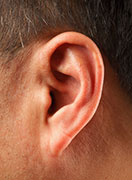- Could Your Grocery Store Meat Be Causing Recurring UTIs?
- Are You Making This Expensive Thermostat Error This Winter?
- Recognizing the Signs of Hypothyroidism
- 10 Strategies to Overcome Insomnia
- Could Artificial Sweeteners Be Aging the Brain Faster?
- Techniques for Soothing Your Nervous System
- Does the Water in Your House Smell Funny? Here’s Why
- Can a Daily Dose of Apple Cider Vinegar Actually Aid Weight Loss?
- 6 Health Beverages That Can Actually Spike Your Blood Sugar
- Treatment Options for Social Anxiety Disorder
HIV Tied to Worse Hearing in Older Adults


A new study finds that adults with HIV tend to have worse hearing than those not infected with the AIDS-causing virus.
Researchers led by Peter Torre, of San Diego State University, assessed the hearing of 262 men averaging 57 years of age, and 134 women averaging 48 years of age. A total of 117 of the men and 105 of the women were HIV-positive.
While the study couldn’t prove cause-and-effect, Torre’s team found that people with HIV tended to have worse lower- and higher-frequency hearing. This was true even after the researchers took other factors into account, such as a person’s long-term exposure to powerful HIV-suppressing antiviral drugs or their HIV “viral load.”
“To our knowledge, this is the first study to demonstrate that HIV-positive individuals have poorer hearing across the frequency range after many other factors known to affect hearing have been controlled for,” the researchers wrote.
The study “implies that HIV may have an independent effect on the inner ear,” said one expert, Dr. Eric Smouha, director of otology-neurology at the Icahn School of Medicine at Mount Sinai, in New York City.
“This finding is fascinating and hopefully will be investigated further,” he added. “Many adults with hearing loss have no readily identifiable cause, and this work may help identify viruses and other risk factors that escape detection now.”
Dr. Darius Kohan is chief of otology and neurotology at Lenox Hill Hospital and the Manhattan Ear, Eye and Throat Hospital, both in New York City.
He said that in the study, “HIV treatment options did not seem to correlate with the hearing loss, so it is the virus itself and the body’s reaction to the virus that causes the hearing deficit, not any hypothetical ear-damaging effects of antiviral therapy.”
“The implication of the study is that HIV-positive patients should be carefully monitored for hearing loss and amplification provided when necessary,” Kohan said. “This sensory deficit may not be preventable once patients are infected, but may be corrected with proper intervention by a hearing aid specialist.”
The study is published online Dec. 26 in the journal JAMA Otolaryngology-Head & Neck Surgery.
More information
The American Speech-Language-Hearing Association provides more information on HIV and hearing loss.
Source: HealthDay
Copyright © 2026 HealthDay. All rights reserved.










